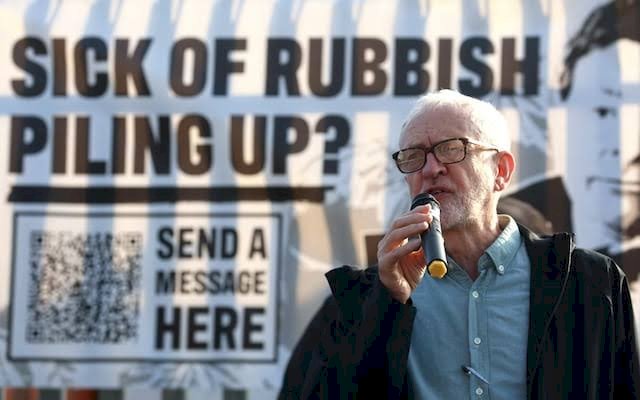Britain’s Left-Reformist Surge and the Excitement It Sparks

by V.U. Arslan
Having gone through five prime ministers in the last six years, Britain is experiencing a period of unprecedented instability. The capitalist economy is unable to overcome its structural crisis because it has failed to achieve productivity growth and lost its historical dynamism. The living standards of the working class are steadily declining due to the relentless implementation of social cuts under the guise of economic crisis. While the National Health Service (NHS) has collapsed, outsourcing has become widespread, wages and benefits have declined, and the housing crisis and high cost of living have crippled workers.
As a result, government after government is being swept aside helplessly, unable to complete their term, due to the growing public outcry and the unresolved nature of systemic problems. While this is the case almost everywhere, right-wing populist/far-right parties are stepping forward to fill this void. In Britain, Reform UK, led by Nigel Farage, embodies this model and has risen to the top party position, garnering 30% of the vote in the polls. The far-right's formula is the same everywhere: Instead of addressing systemic issues, engage in cultural right-wing politics, divide workers, offer nothing but more neoliberalism as an alternative, and mask this lack of substance with the immigration card...
The Rise of Corbyn
Reform UK is rising as a result of the fall from grace of Britain's traditional bourgeois party, the Conservatives, while the Labour Party's crisis is giving rise to a new left-wing alternative. After 14 years of Conservative rule, the Labour Party, led by Keir Starmer and in power for one year, has quickly become synonymous with neoliberal and right-wing policies, proving to everyone that it is no different from the Conservatives. Even those traditionally loyal to the Labour Party are breaking away from the party emotionally and politically.
As the crisis of the system morphs into a crisis within the Labour Party, a new leftist project is emerging at precisely this opportune moment, led by Jeremy Corbyn. Jeremy Corbyn, a left-wing reformist who once led the Labour Party but was ousted by the right-wing establishment due to his own compromising tendencies, has now, under the influence of grassroots pressure, launched a new left-wing party.More than 500,000 people have already signed up to join the new party led by Jeremy Corbyn and Zarah Sultana. This makes the Corbyn-led Your Party (which has yet to be named) already the most popular in Britain. This new party boasts a support level of 18% in polls. There is particularly strong support from youth and the union base. Labour, historically one of the pillars of the British political establishment, is in danger of being sidelined. Similarly, the Greens, which have been fully aligned with the system, are being pushed to the brink of collapse under the pressure of the new party.
Here we come to the most sensitive issue of class struggle. The crisis of capitalism, along with the crisis of bourgeois parties, is turning into a systemic crisis, and it is precisely in this process that the working masses and youth are radicalizing to the left. When the masses find a channel to express their opposition to pro-capital parties, they feel belonging there with great enthusiasm. In conditions where a revolutionary alternative has not yet matured, this energy is directed towards left-reformist politicians. The masses are shifting left, class consciousness is rising, but a struggle by revolutionary forces is necessary to prevent this process from stalling.
Global Trends
It has been repeatedly emphasized that the crisis of capitalism benefits right-wing populism and the far-right worldwide. Authoritarian leaders are on the rise, democracy is in decline, and the far-right is gaining strength. These are objective facts, but we have emphasized that development cannot produce one-sided results and that a "counter/left reaction" will arise, especially in Western metropolises. A dialectical understanding is necessary in the face of the despair and pessimism spread by those who declare the triumph of fascism worldwide. We emphasized that, given the dynamics of class struggle, a progressive energy will arise, particularly in the Western world, against the rise of the right and reactionary forces. In this era, the masses, identified with Trump, Netanyahu, and so on, are fueled by an increasingly intense anger. A tendency toward revolutionary ideas is clearly evident among youth. While struggles in the East tend to manifest themselves more as outbursts of anger, in the West, the masses possess the necessary tools for more mature struggles.
Beyond the example of Corbyn in Britain, it's worth noting the rise of left-wing reformism in the US. Zohran Mamdani, who presented himself as a "democratic socialist" and ran a strong campaign promising social reforms favorable to workers, won the Democratic Party primaries for New York City. Mass protests erupted in June against Trump’s anti-immigrant policies, and confrontations with police in California escalated into widespread violence. We can predict that the class struggle in France will manifest itself in the form of radical mobilizations and strikes, that revolutionary Marxist organizations in France will have significant opportunities to make breakthroughs, and that electoral dynamics will favor the left-wing populist Melanchon.
The current upsurge in many Western metropolises is valuable because it is pushing broad layers of the masses to the left; yet, without the emergence of a genuine revolutionary alternative, the growth of reformist parties will ultimately yield only disappointment.
Corbyn's Limits and the Revolutionaries' Task
Why is reformism a dead end? Because the crisis of the system stems from capitalist functioning and bourgeois private ownership of the means of production, it is inevitable that reformism, which never considers attacking the roots of the system, will become helpless, compromise, and ultimately sell out the working class. On the other hand, revolutionary Marxist politics is not about self-satisfaction by rehashing the most familiar issues about the historical limits of reformism. What matters is building a mass revolutionary party at this historical moment when class struggle is intensifying and playing a revolutionary role in decisive struggles.
Using familiar left-wing rhetoric to call on the masses not to trust Corbyn and then acting as a bystander would only isolate revolutionaries. Revolutionary leadership has nothing to do with preaching purified political comments. It is necessary to utilize the tactical richness developed for such periods by revolutionary Marxism under the leadership of Lenin and Trotsky. It is still unclear how the structure of Corbyn's party will take shape today, but revolutionary Marxists must intervene in this process, never taking responsibility for reformist slippage or abandoning their freedom of criticism. We need not set out rigid blueprints for how this will unfold; nonetheless, the least credible course would be for revolutionaries to remain on the sidelines, isolate themselves, and fail to draw energy from the masses moving leftward.



































